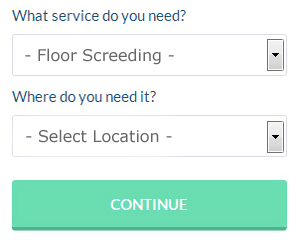Floor Screeding Tynemouth Tyne and Wear (NE30): Are you giving your Tynemouth home a makeover? Dealing with uneven floors in your living space, or rejuvenating a moist cellar? Transform your space from the ground up. Your secret weapon? A skilled floor screeding specialist. They create the perfect starting point: a smooth, level foundation upon which your dream floor - be it wood, tile or carpet - comes to life. Don't just admire, rely on! This key step elevates your floor beyond visual perfection, ensuring the long-lasting strength and durability of your whole structure. Therefore, before venturing into floor coverings, lay the groundwork for success with specialist screeding.
FLOOR SCREEDING CONTRACTORS TYNEMOUTH
A dependable screeding specialist in Tynemouth will have all the know-how and experience to help you achieve a perfect floor in whichever size or shape of room you're renovating. To establish the appropriate form of screed you require, and the most effective way to apply it, they will do a careful evaluation of your project.
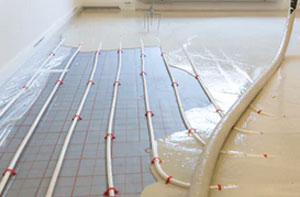
Your screeding specialist will also inform you if a structural engineer is necessary for your project, in order to evaluate load requirements, flex strength and point loadings that your screed floor may need to conform with current British Standards and building regulations.
Working with a qualified and highly trained specialist will guarantee you get the right type of screed for the room's allocated usage and get the maximum lifespan out of your flooring. There are many different kinds of floor screed and choosing the right mix and laying technique is essential if you are to achieve a high quality floor that is fit for purpose and hard-wearing.
Make sure that you get 2 or 3 quotes for your Tynemouth floor screeding project and also ask what standard of finish each quote is for. For residential homes an estimate will normally be provided for an SR (Surface Regularity) standard of SR1 or SR2. SR2 and SR3 will be more affordable options, although the floor screeding finish might have deviations and errors, whilst SR1 guarantees a perfect finish. This means you may have to correct any patches that could cause problems when putting down your finished flooring solution.
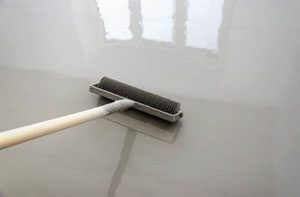
Every Tynemouth screeding company must stick to British Standards (BS8204) and should have some kind of accreditation from screeding material and equipment manufacturers, e.g. Flowcrete, Cemfloor, Gypsol. This accreditation scheme showcases a contractor's high quality performance and training in the use of a manufacturer's screeding merchandise.
Tynemouth commercial screeders might be involved in screeding floors in schools, hospitals, salons, shopping centres, warehouses and factories.
TYPES OF SCREED
Standard Screeds - This is acceptable for standard residential use and is a mixture of cement and sand. 5 parts sand to 1 part cement is the normal mix for standard screed. This 5 to 1 ratio standard screed will set hard at a rate of one millimetre per day after laying.
Fibre Reinforced Screed - Used mostly with under floor heating systems and is the advised choice in such projects. The increased strength and flex provided by the fibres within this screed mix help protect the floor from shrinkage and cracking due to heat. It dries at the same rate as a standard screed, at about 1mm per day.
Advanced Drying and Fast Drying Screeds - As the name would suggest, this screed dries quickly and allows you to use the floor area much faster. The majority of the fast or advanced drying screeds are of the fibre reinforced kind and are perfect for a wide range of flooring projects where the faster drying rate of 3-7mm is advantageous.
Liquid or Self-Levelling Screeds - Used to provide the highest quality of finish, especially where SR1 levels are essential, by a cement and latex mixture. Mainly used to improve a damaged floor or poor substrate level in order to lay a brand new flooring surface, like tiles over it. Even with a depth of just 1mm, the latex polymers within the mixture provide a high strength surface for a wide variety of uses.
Industrial and Heavy Duty Screed - Designed for maximum strength and durability in areas where traffic is expected to be high or heavy loading on the floor is necessary.
Polymer Screeds - These provide a high level of strength with a minimal thickness. Polymer screeds are made by many manufacturers and on account of their diverse chemical compositions have specific curing times for each individual product.
SCREEDING PREPARATION AND INSTALLATION
Preparation is essential for a top quality screed surface that will be durable and hard wearing. It is important that all contaminants such as debris, paint, grease or oil is removed from the base before pouring any screed, because these can affect the bonding capability that a quality floor screed demands.
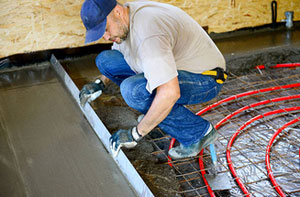
If cleansing products have been used it is important to remove any traces of detergent or soap, and allow the floor surface to dry naturally. It's vital to fix any cracks or crevices in the surface to prevent them being visible and "travelling" up into your freshly screeded floor. An on-site survey will allow your Tynemouth screeding installer to identify this preparation work and finish it before commencing to pour the screeding.
Before any screeding can be laid a DPM (damp proof membrane) will have to be put down to shield the screed and final flooring from moisture. The DPM is made out of thick polythene sheeting and different layers may be used to serve as a moisture barrier for the screed.
If the area is susceptible to radon then another barrier is needed to stop this harmful gas from entering from the ground. This could be as simple as an air-tight membrane, or in severe situations an extraction and ventilation system will be installed beneath the floor screed to draw out any influx of air and gas from the ground.
As soon as these steps have been taken the screeders will put on a sealant or primer to the prepared base surface. A primer assists in the screed bonding process to the base surface and different varieties exist based upon which kind of screed is being used. These substances require experienced tradesmen to apply them in the appropriate proportions by using airless sprays and other custom-made equipment.
If you are installing underfloor heating, now is the time that it will need to be properly laid out and installed. The under floor heating system will be carefully positioned and attached firmly to insulation panels to avoid any movement in the course of the screed installation process. Underfloor heating is one of the most efficient ways to heat a room and a properly installed system will produce even level of warmth in all areas of the floor.
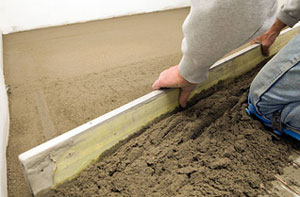
The screed can now be mixed and prepared in situ and poured onto the floor base. The specific requirements of the room will determine the sort of screeding that is used. For quick drying and advanced screeds there'll be at least a twenty four hour delay before it is able to be walked over, and a further Three days minimum before any flooring material can be laid over it. If you're aiming to end up with a nicely finished and durable floor surface you must stick to the manufacturer's guidelines with regards to standard and heavy duty screeds where the timescale will be longer.
You can check the SR standard of the completed screeding once it's hardened enough to walk on. Through the use of a two metre straight-edge the floor surface is examined for any dips, deviations and ridges in the screed surface.
- SR1 - Over the entire floor area, if there are no disparities of more than three millimetres from the straight-edge, you've got a top quality SR1 specification surface.
- SR2 - If the floor surface has a deviation from the straight-edge of 5 millimetres or less it is SR2 level and is the standard for commercial and industrial projects.
- SR3 - If the deviation around the whole space is 10mm or less the screed quality is specified as SR3 and is highly suitable for utility and garage areas.
If you require load bearing checks, a structural engineer is required to perform the testing. This assessment will ascertain the strength of the screeding and its viability for the proposed use. An assessment called the drop hammer test is carried out at several areas on the screed layer and the outcomes recorded. The specialist measurement and testing tools mean that this can only be undertaken by a trained structural engineer applying the guidelines of BS8204. (Tags: Floor Screeding Tynemouth, Screeding Tynemouth, Floor Screeding Services Tynemouth, Floor Screed Tynemouth).
Floor screeding services are available in Tynemouth and also in: Monkseaton, Marden, South Shields, South Wellfield, Percy Main, Earsdon, Holystone, West Allotment, North Shields, Murton Village, Wallsend, Whitley Bay, Willington Quay, Wellfield, Cullercoats, Chirton, and in these postcodes NE30 4EF, NE30 2SN, NE30 2LW, NE30 4AZ, NE30 4AH, NE30 4EJ, NE30 2LN, NE30 4LD, NE30 2PR, and NE30 4LU. Locally based Tynemouth floor screeders will most likely have the postcode NE30 and the dialling code 0191. Verifying this can ensure you access local floor screeding. Tynemouth home and business owners can benefit from these and many other floor related services. To make enquiries and get floor screeding estimates, click the "Quote" banner.
Multi-Coloured Floor Screeds
Multi-coloured floor screeds are an innovative way to add personality and practicality to any space. These decorative screeds combine durability with design, creating a seamless flooring solution that's as robust as it is visually striking. Whether for commercial spaces, industrial areas, or even modern homes in Tynemouth, multi-coloured screeds offer a unique blend of style and functionality. Their vibrant finishes allow for customisation, enabling you to choose colours and patterns that reflect your personal taste or branding requirements.
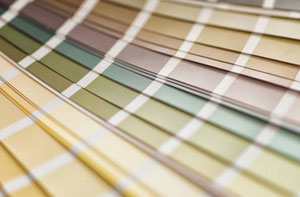
Multi-coloured floor screeds are highly versatile, which is one of their best features. They're ideal for high-traffic areas, thanks to their resistance to wear and tear, and their seamless finish ensures easy cleaning and maintenance. In commercial settings, bold colour combinations can make interiors visually striking or define different zones within a space. For residential use, softer tones and intricate patterns can add a contemporary elegance to kitchens, bathrooms, or living areas.
When it comes to more than just looks, multi-coloured screeds really shine as a long-term investment. They're incredibly hard-wearing, meaning they're made to stand the test of time, even in tough environments. You can also customise them to meet specific requirements, like adding slip resistance or extra protection against spills and chemicals. Whether you want to breathe new life into an old floor or create a striking design feature, multi-coloured floor screeds provide a stylish and functional solution for your home or business in Tynemouth. They combine practicality with flair, making any space feel unique and special. (Tags: Multi-Coloured Floor Screeds Tynemouth).
Latex Floor Screeds
Latex floor screeds are widely chosen for creating smooth, level surfaces before laying final floor coverings. Mixing cement with latex results in screeds that are flexible and simple to apply. Latex screeds are specifically designed for uneven or cracked floors, as the latex component enhances adhesion and prevents cracking.
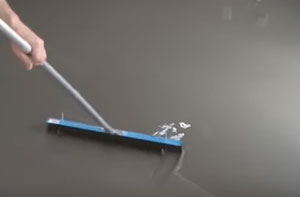
The application of latex floor screeds is a simple process. To ensure good adhesion, the existing floor must first be cleaned and primed. Pour the latex screed mixture onto the floor next, and spread it evenly with a trowel. A level, smooth surface suitable for tiles, vinyl, or other floor coverings is achieved through this process.
The quick drying time is one of the key benefits of latex floor screeds. In contrast to conventional screeds that can take days to dry, latex screeds can be safely walked on within a few hours. Both commercial and domestic projects with time constraints benefit from the quick drying properties of latex floor screeds. (Latex Floor Screeds)
Granolithic Screeding
In industrial or commercial environments in Tynemouth, a method known as granolithic screeding is employed to produce a hard-wearing and durable surface. With a mix of cement, sand, and fine aggregate, including granite or other hard stone, it delivers added strength and resilience over standard concrete. Particularly beneficial in zones subjected to heavy traffic or machinery, this kind of screed effectively withstands wear and tear.
Installing the granolithic screed involves spreading it over a prepared base, usually a concrete subfloor. Carefully levelled and compacted, the screed ensures a smooth, even surface capable of withstanding heavy use. A durable outcome can be achieved, along with an attractive, smooth finish, by completing it with a polished effect, particularly suited for busy areas like warehouses or workshops in Tynemouth.
Valued for both its strength and cost-effectiveness, granolithic screeding is a popular choice. It requires very little maintenance once laid and has the potential to last for many years, rendering it a practical choice for spaces in both the industrial and commercial sectors. Granolithic screeding offers a long-lasting floor solution, suitable for factories, loading bays, or large residential garages. (Tags: Granolithic Screeding Tynemouth)
What Does Screeding Do?
Construction projects benefit from the various important functions of screeding:
- Surface Protection.
- Structural Integrity and Stability.
- Corrections to Subfloors.
- Underfloor Heating System Support.
- The Even Distribution of Loads.
- Levelling and Smoothing.
- Compatibility with Floor Finishes.
- Improving Thermal and Sound Insulation.
All in all, a stable, durable and level floor surface is achieved through the vital role of screeding. The floor finish is assured of a solid foundation, ensuring its maintenance of quality and aesthetics, and ability to withstand the demands of everyday use for years to come.
Screed Reinforcement
The application of screed reinforcement is a means of enhancing the durability and strength of concrete screeds. Thin, flat layers of concrete known as screeds are applied to a base layer to create a level surface. As flooring, they are frequently utilised in building projects, but they can also serve as a finishing layer for walls and ceilings.
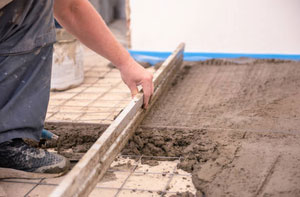
Screed mixture during installation is infused with reinforcement materials, such as steel mesh, wire or polypropylene fibres, to prevent cracking and improve strength. The distribution of load and weight across the surface is evened out by this reinforcement, and it also enhances its ability to resist impact, abrasion and thermal changes.
The selection of reinforcement material for a project is based on various factors, such as load capacity, finish and thickness, and is tailored to meet specific requirements. To avoid displacement over time and ensure even distribution throughout the screed, the reinforcement must be properly installed, which is vital. The use of screed reinforcement allows building professionals to make sure that their projects will stand the test of time and provide a high-quality, functional surface for many years to come.
Polished Screed Floors Tynemouth
For property owners in Tynemouth who are looking for a sleek and contemporary flooring option, polished screeds have become an increasingly popular choice. Offering a durable and aesthetically pleasing base, these floor screeds involve a smooth, trowel-finished surface suitable for various living spaces. In this technique, a cementitious material is laid and then polished to a shiny finish, producing a floor that is both practical and visually striking.

The low maintenance requirements of polished screed floors is one of their key benefits. Polished screeds, unlike conventional flooring alternatives, do not demand regular sealing or waxing. Ideal for asthma or allergy sufferers, their smooth surface prevents the accumulation of dust and allergens. Furthermore, the durability of polished screeds is exceptional, providing long-term resilience and significantly lowering the need for expensive replacements and repairs.
Polished screed floors also provide Tynemouth property owners with a great deal of versatility. To achieve a cohesive aesthetic, polished screeds come in a wide range of colours and finishes, allowing them to adapt to any interior decor or design scheme. Whether you're aiming for a detailed pattern or a minimalist appearance, polished screeds can boost the overall appearance of a property. In addition to this, by maximising natural light, the mirror-like surface that they create can brighten rooms, creating a more welcoming and spacious environment. (Polished Screed Flooring Tynemouth)
Screed Floor Removal
To strip away existing screed layers from surfaces, screed floor removal is used in renovation and construction. This is an essential process. This approach removes old flooring and prepares the surface for new flooring or other improvements, leaving a clean and smooth surface ready for the next step.
Professional contractors with expertise in screed floor removal play a vital role in performing this intricate task. A new lease of life for your floor is set by the safe and efficient elimination of the old screed, which is guaranteed by their proficiency. The value of this fresh start is manifold, including repairs, upgrades and changes in design.
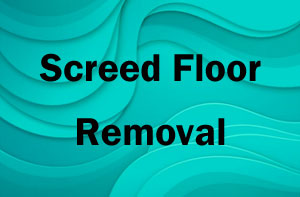
Removing floor screed is a challenging process that requires the use of specialised equipment and techniques, tailored to the particular needs of the job. Meticulous assessment of the existing screed's type, thickness, and the applied surface is essential. Careful attention to detail during removal ensures effective removal with minimal disruption to the underlying structure.
A key benefit of removing screed flooring is the chance to fix any problems that have arisen over the years. A thorough evaluation of the substrate is possible only after removing the old layer of screed, if it's uneven, damaged, or otherwise compromised. Contractors can use this evaluation to identify and rectify any structural problems that could affect the installation of new flooring materials.
Aside from that, the removal of screed flooring forms a vital preparatory phase in the installation of underfloor heating systems in Tynemouth. By removing the current screed, contractors can create a level and clean surface that is conducive to the installation of heating elements. This paves the way for an effective and efficient underfloor heating setup, improving the comfort and energy efficiency of the space.
Regarding sustainability, the act of screed removal is in harmony with the objectives of material waste reduction and reusability. Recycling or repurposing the extracted screed for other construction initiatives often reduces the environmental impact associated with its removal.
In summary, the removal of screed floors stands as a complex and crucial process within the domain of construction and renovation. It requires the expertise of professional flooring contractors who can negotiate the challenges of removing pre-existing screed layers while ensuring the integrity and safety of the base structure. By enabling a fresh start for the floor, screed floor removal contributes to the creation of durable, efficient, and aesthetically pleasing flooring solutions across various settings in Tynemouth. (27543 - Screed Removal Tynemouth)
Tynemouth Screeding Related Tasks

There are a wide array of tasks that can be carried out by your local Tynemouth floor screeding company including floor smoothing compounds, screed laitance removal, sand floor screed, flow screeding in Tynemouth, floor noise dampening, fibre reinforced floor screeding, acid etching concrete, wet room floors in Tynemouth, commercial screeding in Tynemouth, floating screed, cellar floor screeding, bathroom floors, bonded concrete screeding, underfloor insulation, garage screeding, floor screeding tools, substrate floor preparation, polished concrete flooring in Tynemouth, floor preparation, underfloor heating installation, polished screed floors, acoustic flooring solutions in Tynemouth, anhydrite screeds, waterproof screeding, warehouse floor screeding, screed floor removal, decorative floor screeding in Tynemouth, floor levelling, underfloor heating screed, structural screeds, and lots more floor screeding tasks. Listed are just a small portion of the duties that are performed by those specialising in screeding. Tynemouth professionals will let you know their whole range of screeding services.
Screeding Enquiries

The latest floor screeding customer enquiries: Brian Saunders from Cullercoats was looking for a floor screeding company to lay a liquid screed in 2 rooms of his property. Madison Jones and Adam Jones recently enquired about getting a price for screeding a workshop floor in North Shields. Christina and Dylan Matthews recently enquired about the possibility of installing underfloor heating and screeding a floor in Monkseaton. Mr and Mrs Marshall recently requested an estimate for screeding the floor of a basement in Earsdon. Amanda and Michael Woods recently asked for a quote for screeding over an old concrete floor in South Wellfield. Anne Harrison and Zachary Harrison recently enquired about getting a price for screeding a workshop floor in Wallsend. Taylor and Nathan Anderson recently asked for a quote for screeding over an old concrete floor in Whitley Bay. Susan Owen recently enquired about the possibility of screeding a garage floor in a terraced house in Willington Quay. Brian Clark from North Shields was looking for a floor screeding company to lay a liquid screed in 2 rooms of his property. Megan Morris from Monkseaton was looking for a local floor screeding company to lay a flow screed in 2 rooms of her property. Amanda Kennedy from Whitley Bay was looking for local floor screeding companies nearby. Jennifer Collins from Chirton was looking for local floor screeding companies nearby. Alyssa Richardson from Willington Quay was looking for local floor screeding companies nearby. All these local people did a search for "floor screeding near me" and came across this web page on either Yahoo, Bing or Google.
Tools Required by a Floor Screeder
- Straight Edge
- Gloves
- Heavy Duty Spirit Level
- Trowel
- Humidity Tester
- Floor Profile
- Float
- Knee Protection
- Shovel
- Wheelbarrow
- Measure
Floor Screeding Near Tynemouth
Also find: South Shields floor screeding, Percy Main floor screeding, Earsdon floor screeding, Monkseaton floor screeding, Whitley Bay floor screeding, Wellfield floor screeding, Holystone floor screeding, West Allotment floor screeding, Marden floor screeding, South Wellfield floor screeding, Willington Quay floor screeding, Wallsend floor screeding, Murton Village floor screeding, North Shields floor screeding, Cullercoats floor screeding, Chirton floor screeding and more. There are firms who do screeding in the majority of these towns and areas. These specialists, with their necessary expertise and skills, excel in providing top-quality screeding solutions. In the realm of screeding for both domestic and commercial properties, they're highly trained, guaranteeing high quality work. For local home and business owners seeking screeding services, it's a super easy process to obtain quotes and gather information. All you have to do is click here. If you need to get prices for floor screeding - don't delay, get a quote today!
Floor Screeding Services Tynemouth
- Bathroom Screeding
- Liquid Screeds
- Fibre Reinforced Floor Screeding
- Cheap Floor Screeding
- Screeding Advice
- Polished Screed Floors
- Underfloor Heating Installations
- Commercial Floor Screeding
- Screeding Services
- Floor Screeding
- Domestic Screeding
- Floor Insulation
- Decorative Floor Screeding
- Final Floor Finishes

Other Trades Tynemouth: Ok, so you are presently in search of screeding in Tynemouth, but you may also require vinyl flooring in Tynemouth, garage conversion in Tynemouth, gutter cleaning in Tynemouth, a stonemason in Tynemouth, a roofing contractor in Tynemouth, an electrician in Tynemouth, a damp proofing specialist in Tynemouth, a plasterer in Tynemouth, an odd job man in Tynemouth, a flooring specialist in Tynemouth, rubbish removal in Tynemouth, an underfloor heating specialist in Tynemouth, a builder in Tynemouth, during the course of any home improvement assignment in Tynemouth. To send in enquiries and get estimates, simply click on the highlighted links.
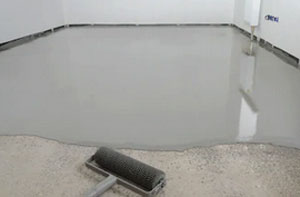 Floor Screeding Tynemouth
Floor Screeding Tynemouth Screeding Near Me
Screeding Near Me Floor Screeders Tynemouth
Floor Screeders TynemouthTo get local info regarding Tynemouth, Tyne and Wear look here
More: Polished Screeding, Screeding, Coloured Screeding, Cheap Screeding, Screeding Contractors, Screed Reinforcement, Screed Floors, Floor Levelling, Polished Screeding, Screeding Specialists, Cheap Screeding, Floor Levelling, Residential Screeding, Floor Levelling Services, Floor Screeders, Residential Screeding, Floor Levelling, Floor Screeders, Screeding Contractors, Decorative Screeding, Screed Flooring, Screed Reinforcement, Decorative Screeding, Screeding Companies, Screeding Specialists, Screeding Specialists, Self-Levelling Screeds, Screeding, Floor Screeding, Screeding Services, Cheap Screeding, Commercial Screeding, Polished Screeding, Screeding Contractors, Driveway Builders, Driveway Builders, Concrete Driveway Specialists.
Floor screeding in NE30 area, and dialling code 0191.
TOP - Floor Screeding Tynemouth
Floor Screeding Tynemouth - Floor Screeding Companies Tynemouth - Commercial Screeding Tynemouth - Screeder Tynemouth - Floor Screeders Tynemouth - Floor Screed Companies Tynemouth - Fast-Dry Screeding Tynemouth - Screeding Quotations Tynemouth - Floor Screeding Services Tynemouth




